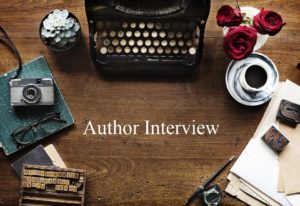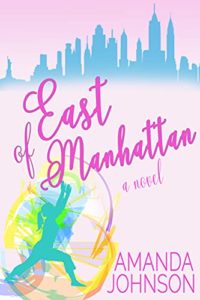An Interview with Amanda Johnson
 Fellow 2021 Debuts author Amanda Johnson and I have something in common: we both put off the pursuit of a dream for something practical that could make money. For me, that was writing. For her, that was acting. But now, Amanda is an actor and a writer with “twenty years of storytelling experience” in different capacities, including “voiceover artist, Walt Disney World performer, host, and producer.” Her debut, East of Manhattan, is women’s fiction, and she credits Elizbeth Gilbert’s Big Magic for helping make it come to fruition (and I bet the dark chocolate she eats every day helped too!). Today is Amanda’s launch day, and I realize just how busy she is, so I’m especially thankful that she took some time to thoughtfully answer my questions.
Fellow 2021 Debuts author Amanda Johnson and I have something in common: we both put off the pursuit of a dream for something practical that could make money. For me, that was writing. For her, that was acting. But now, Amanda is an actor and a writer with “twenty years of storytelling experience” in different capacities, including “voiceover artist, Walt Disney World performer, host, and producer.” Her debut, East of Manhattan, is women’s fiction, and she credits Elizbeth Gilbert’s Big Magic for helping make it come to fruition (and I bet the dark chocolate she eats every day helped too!). Today is Amanda’s launch day, and I realize just how busy she is, so I’m especially thankful that she took some time to thoughtfully answer my questions.
Christina: Your debut novel, East of Manhattan, launches today. What made you choose to write a novel over a screenplay for this particular story? Does the structure of a novel have an advantage here?
Amanda: It would have made more sense for me to write a screenplay given my background as an actor and that all my previous creative writing ventures have been in the form of a screen or stage play. All I can say is that when I got the idea for this story, I knew it needed to be a book. It’s something I felt deep down. So, I honored that feeling and went with it. I wouldn’t say there’s a particular advantage of East of Manhattan being in the form of a novel, that’s just the way I’ve always seen this story. I’d love to turn it into a screenplay one day.
Christina: East of Manhattan takes on a heavy topic, fertility, when the book’s protagonist, Julie, realizes that her “fertility is not what she always assumed it would be.” Many of us take our fertility for granted until issues arise. What made you want to tackle such a topic? How much research did you have to do?
Amanda: That’s exactly what happened with Julie in the book. She took her fertility for granted, never thinking she’d have an issue until she goes for her regular exam and is told that at her age, 35, she is considered geriatric in the pregnancy world and her chances of having a baby start to dwindle every year. Now, I understand the science and seriousness behind this fact and realize there is increased risk with pregnancy the older you get. But do 35-year-old women have to be called geriatric? It’s just one more thing to give women a complex about getting older. I wanted to explore this topic and test the idea that it’s possible to have a healthy baby after 35. I also wanted to bring some levity to the topic. I did the best research of all—I lived through this entire experience. The fear, the anxiety, the extra testing. I also talked to doctors and other women who have had similar experiences and relied a lot on internet research.
Christina: Your website states: “Amanda Johnson is a storyteller. As a parade performer at Walt Disney World, as an actor in New York City, and now as a writer and actor on the west coast, Amanda Johnson tells stories.” What was the first story you ever told? What is it about “telling stories” that appeals to you?
Amanda: I remember making up plays at my grandma’s house and performing them for my family. I was very young, maybe four or five. My grandma had fabulous scarves, hats, and costume jewelry that I would weave into these plays. She was also wonderfully encouraging and sweet, and I never felt ridiculous spinning these tales. At the time, I liked the burst of applause I’d get at the end of a performance and how I could get lost inside my pure, innocent creativity. Those things are still appealing to me, but as I’ve grown up I also acknowledge that having the gift to transport people into another world or perhaps offer a point of view or feeling the reader has never considered before is something I love about telling stories.
Christina: We all have different journeys on the path toward book publication. Can you tell us a little bit about yours? What was the greatest lesson you learned on this journey?
Amanda: When I started writing my novel, I had absolutely no idea how much work it would be to get published. I didn’t know what happened after I finished the first draft. My book is fiction but based on a real time in my life when my husband worked as a house manager for a wealthy Manhattanite. There were so many “only in New York” experiences that I started keeping a journal. I thought maybe I’d turn it into a book one day. That was about six years ago. I wrote the book in fits and starts at first. A few hours in the library, on my commute to work—wherever I could get a couple hours alone. I spent one summer vacation waking up early and working through revisions before my husband and son woke up. I consulted with a developmental editor and hired a proofreader. When I felt I had the novel in a good place, it was time to query agents. But I had no idea when I’d find the time to do the immense amount of research it takes to find a literary agent. I was working a full-time job, I was prepping for the lead role in a film, and I had a young son at home.
And then coronavirus happened. Early in the pandemic was an incredibly stressful and scary time. I worked in the travel industry and was laid off. While unfortunate, I now had the time to research literary agents and write a query letter plus all the other materials you need to pitch to agents. I got a few bites, but no representation. That’s when I began to look into small publishers who would accept work from unrepresented authors. I declared that if I didn’t find a small press that wanted to publish my book, that I would self-publish by May 2021. I choose this date because I wanted my book to come out during the summer so I could position it as a summer read. East of Manhattan really fits in that category—a fun, quick women’s fiction read perfect for a beach vacation.
In January of 2021, I heard back from the small publisher Books to Go Now that they wanted to publish my story. Since then, it has been a whirlwind of contracts, editing, cover approvals, eBook formatting, and teaching myself as much as I can about book marketing and publicity. Small presses traditionally do not provide marketing and publicity services so it falls onto the authors to get their books out there. I think that’s the biggest lesson I’ve learned: that once the writing is done, there’s a whole heap of more work to do! That, and perseverance. I could have quit so many times along the way, but I was driven by my dream of being a published author, and it kept me going.
Christina: I had fun watching the reels and listening to the voice demos featured on your website. What got you into acting? Do you get the same satisfaction from writing a book, writing a screenplay, and acting in a production?
Amanda: Thank you! This speaks back to the plays I used to put on for my family as a kid. I can’t pinpoint the exact moment I knew I wanted to act, it’s something that’s always been with me. Growing up, I acted in school plays and community theater. I come from a creative family, so I think that plays into it. My uncle is a choreographer, and my brother is a chef. I didn’t pursue acting as a profession though at first, that came later. I was in my late twenties, stage managing Romeo and Juliet, sitting backstage in the dark and wearing all black, watching the actors on stage during an audience talkback. That moment I knew I wanted to give acting a shot for real.
I do get similar satisfaction from writing and acting. To me, it’s about creative fulfillment. I love that I can write from anywhere and writing can take different forms like journaling, screenplays, or a novel. When I’m working on a new project whether it’s acting or writing, I am creatively fulfilled.
Christina: Some authors like to imagine the ideal cast for their books (whether or not that story becomes a screenplay). Do you have an ideal cast for East of Manhattan?
Amanda: Well, Julie would be played by me, obviously! If East of Manhattan were made into a film, I’d like to explore a diverse cast. I’d like to see River, Julie’s best friend, as an LGBTQ character. And I also think casting Jake Collins as a person of color would make a powerful statement.
Christina: What does literary success look like to you?
Amanda: Over the years, I’ve had to redefine what success means to me. I realized I held antiquated ideas of success equals money and power. That may be true for some people, but I’ve realized success means something different to me. For me literary success means that I have a set of consistent, positive creative habits such as a dedicated writing practice, prioritizing time to write, finding a community of like-minded writers, and compassion for my creativity. Writing, like acting, is a long game, so setting small goals and keeping consistent is key to success.
Amanda can be found in multiple places!
Website: https://amanda-johnson.com/writer
Instagram: @amandaj1/
Twitter: @_AmandaJohnson
Thanks to Amanda for agreeing to this interview! If you know of an author who’d like to be featured in an interview (or you are an author who would like to be featured), feel free to leave a comment or email me via my contact page.

